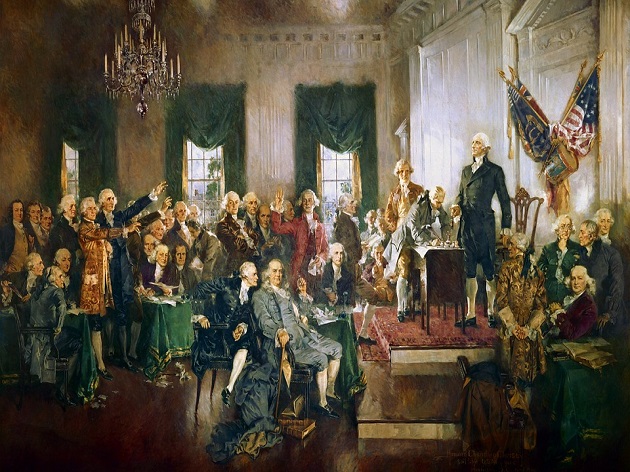アメリカ合衆国憲法を読むの2回目です。
今回は第四条「両院の選挙」、第五条「院の手続き」、第六条「議員の報酬、不逮捕特権」、第七条「代表者会の先議事項と大統領拒否権」についてです。
連邦議会
Section. 4. 第四条 The Times, Places and Manner of holding Elections for Senators and Representatives, shall be prescribed in each State by the Legislature thereof; but the Congress may at any time by Law make or alter such Regulations, except as to the Places of chusing Senators. 元老院議員および代表者の選挙の時、場所、方法はそれぞれの州の立法部により定められる。しかし連邦議会はいつでも法律により、元老院議員の選出場所以外につき、その規定を制定あるいは変更できる。
– prescribe:規定する、定める。
The Congress shall assemble at least once in every Year, and such Meeting shall be on the first Monday in December, unless they shall by Law appoint a different Day. 連邦議会は少なくとも毎年一度召集され、その会合は、法律により異なる日を指定されない限り、12月の第一月曜日からとする。
– このセンテンス:議会開始期日については後の修正により変更されています。
Section. 5. 第五条 Each House shall be the Judge of the Elections, Returns and Qualifications of its own Members, and a Majority of each shall constitute a Quorum to do Business; but a smaller Number may adjourn from day to day, and may be authorized to compel the Attendance of absent Members, in such Manner, and under such Penalties as each House may provide. 両院はそれぞれ、議員の、選挙、開票結果、そして資格を判定し、そして、それぞれ過半数が議事を行なうための定足数となる。しかし、不足の際は翌日へ延期とし、それぞれの院が定める制裁のもと、欠席議員の出席を強制するものとする。
– Returns:開票結果。
– Quorum:定足数。
– adjourn from day to day:翌日へ延期する。
– compel:強制する。
Each House may determine the Rules of its Proceedings, punish its Members for disorderly Behaviour, and, with the Concurrence of two thirds, expel a Member. それぞれの院は議事規則を定め、妨害行為を行なう議員を罰し、そして3分の2の同意により議員を除名することができる。
– disorderly:無秩序な、びん乱する。
– expel:除名、放逐、追放。
Each House shall keep a Journal of its Proceedings, and from time to time publish the same, excepting such Parts as may in their Judgment require Secrecy; and the Yeas and Nays of the Members of either House on any question shall, at the Desire of one fifth of those Present, be entered on the Journal. それぞれの院は議事録を作成保管し、随時、秘密とする判断がなされた部分を除き、それを公表する。そして採決における議員の賛否は出席者の5分の1の要求があれば、議事録に記載される。
– a Journal of its Proceedings:議事録。
– the Yeas and Nays:賛否。
Neither House, during the Session of Congress, shall, without the Consent of the other, adjourn for more than three days, nor to any other Place than that in which the two Houses shall be sitting. どちらの院も議会の会期中に、他の院の同意なく、3日以上の休会をすることはできない、また開会場所を移動することもできない。
– adjourn:休会する、移す。
議員の不逮捕特権
Section. 6. 第六条 The Senators and Representatives shall receive a Compensation for their Services, to be ascertained by Law, and paid out of the Treasury of the United States. 元老院議員そして代表者は法律の規定により合衆国の国庫より職務に対しての報酬を受取る。
– compensation:報酬。
– to be ascertained by Law:法の定めにより。
– treasury:国庫。
They shall in all Cases, except Treason, Felony and Breach of the Peace, be privileged from Arrest during their Attendance at the Session of their respective Houses, and in going to and returning from the same; and for any Speech or Debate in either House, they shall not be questioned in any other Place. 議員、代表者は反逆罪、重罪、治安妨害を除いて、いかなる場合も、それぞれの院の会議に出席しているとき、また出退席の途上における不逮捕特権を有する。そして院内での発言、議論につき、他所において責任を問われない。
– treason:反逆罪。
– felony:重罪。
– breach:妨害行為。
– privileged from arrest:不逮捕特権。
No Senator or Representative shall, during the Time for which he was elected, be appointed to any civil Office under the Authority of the United States, which shall have been created, or the Emoluments whereof shall have been encreased during such time; and no Person holding any Office under the United States, shall be a Member of either House during his Continuance in Office. 元老院議員あるいは代表者は在任中、新設されたあるいは報酬額が増額した合衆国の文官に指名されない。合衆国の官職にあるものは在職中はどちらの院の議員にもなれない。
– emolument:報酬、俸給。
– encrease:increaseの古い表現です。
– his Continuance in Office:勤続。現在であれば、his or herと表現されるところですが、この当時はhisしかありえませんでした。
大統領の拒否権
Section. 7. 第七条 All Bills for raising Revenue shall originate in the House of Representatives; but the Senate may propose or concur with amendments as on other Bills. 歳入を増加させること、にかかわる法案はすべて代表者会にて先議されるが元老院はその他の法案同様に修正を提案あるいは修正を伴っての同意をなしうる。
– bill:議案、法案。
– raising revenue:歳入を増加させるあるいは上昇させる、つまり増税、収税という意味です。税金にかかわる法案は代表者会にて先に審議されるという規定です。
Every Bill which shall have passed the House of Representatives and the Senate, shall, before it become a law, be presented to the President of the United States: If he approve he shall sign it, but if not he shall return it, with his Objections to that House in which it shall have originated, who shall enter the Objections at large on their Journal, and proceed to reconsider it. If after such Reconsideration two thirds of that House shall agree to pass the Bill, it shall be sent, together with the Objections, to the other House, by which it shall likewise be reconsidered, and if approved by two thirds of that House, it shall become a Law. But in all such Cases the Votes of both Houses shall be determined by Yeas and Nays, and the Names of the Persons voting for and against the Bill shall be entered on the Journal of each House respectively. If any Bill shall not be returned by the President within ten Days (Sundays excepted) after it shall have been presented to him, the Same shall be a Law, in like Manner as if he had signed it, unless the Congress by their Adjournment prevent its Return, in which Case it shall not be a Law. 代表者会と元老院を通過したすべての法案は、法として成立する前に、合衆国大統領に提示される。もしも彼が承認するならば署名し、そうでなければ拒否理由を付して発議した院へ差し戻す。その院は議事録にすべての拒否理由を記載し、再議する。その再議にて3分の2の多数で可決したならば、その法案は拒否理由とともに他の院へ送付される。その院にて同様に再議し3分の2の多数で可決した場合は、その法案は成立する。 しかしその場合はすべて、両院における投票は記名投票とし、法案への賛否は議員毎にそれぞれの院の議事録に記載される。法案が大統領に提示されて、日曜を除いて10日以内に差し戻されなければ、署名されたものと見なされて法案は成立する。議会が休会となって差し戻しが行えなかった場合は除く。
– he:この当時は大統領を示す代名詞はheしかありえませんでした。
Every Order, Resolution, or Vote to which the Concurrence of the Senate and House of Representatives may be necessary (except on a question of Adjournment) shall be presented to the President of the United States; and before the Same shall take Effect, shall be approved by him, or being disapproved by him, shall be repassed by two thirds of the Senate and House of Representatives, according to the Rules and Limitations prescribed in the Case of a Bill. 休会に関する採決を除いて、元老院及び代表者会の同意が必要なすべての命令、議決及び投票は合衆国大統領に送付される。そして大統領の承認によって効力を生ずる。承認されなかった場合は、法律案について定められている規則と制限に従って、元老院と代表者会の3分の2の多数により再可決される必要がある。
まとめ
議会の手続き、議員の不逮捕特権、また、大統領には拒否権があるものの、再議決により法案は成立される、など、近代的な民主主義の原理がこの憲法に盛り込まれていることがよくわかります。
しかし、この時代には、公職には男性しかつけなかったということも読み取ることができ、その部分においては歴史を感じさせるのでした。
次回以降も引き続きこの興味深い憲法を読んでいきたいと思います。
![EnglistA [イングリスタ]](https://www.english360.jp/mgp2/wp-content/uploads/2015/09/site-title.gif)


